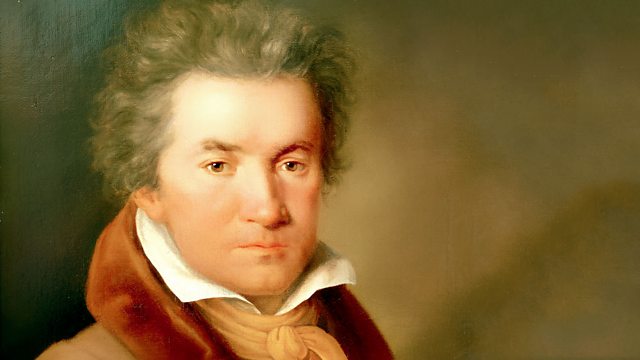
Beethoven Masters Vienna
Donald Macleod explores the year 1795, when Beethoven sets out to make his mark in Vienna.
Donald Macleod explores the life and music of Beethoven, taking a snapshot view through the window of five of the composer's thirty-two piano sonatas. When Beethoven moved to Vienna in 1792, for the first few years he was seen to be more of a pianist than a composer. This viewpoint changed, but the piano would always be a significant instrument for Beethoven, who went on to compose not only piano sonatas amongst his prodigious output, but also a number of piano concertos, and other works for the instrument. Donald Macleod focuses on five of the piano sonatas, including the Pastoral and the Appassionata, and takes a look at Beethoven's life during these periods, including the other works he composed at the time.
By 1792, Beethoven felt he needed to move on from the musical opportunities offered by his native city of Bonn. Wanting to stretch his wings and pursue his career as a composer, he turned his attention to the capital of the Austro-Hungarian Empire, Vienna. Beethoven didn't launch himself straight into the Viennese public eye as a composer, but instead made his initial impression there as a pianist, performing one of his early concertos.
Life in Vienna was hard to begin with, with Beethoven relying on financial support from the Elector in Bonn. This eventually dried up and Beethoven was fortunate that Prince Lichnowsky came to his aid, allowing the composer to move into the Prince's house, and introducing him to the leading musicians in Vienna. Although Beethoven often found his relationship with the Prince stifling, he dedicated a set of three Piano Trios to him, including the Piano Trio No.1 in E flat.
Beethoven had now launched himself into publication. This was a carefully timed event, so that not only was the Viennese public treated to his opus 1 Piano Trios, and opus 3 String Trios, but also his set of three Piano Sonatas opus 2, including the Sonata no.1 in F minor. The press declared that with the publication of these three sonatas, Beethoven was now assured a place in "the Holy of Holies of Art".
Last on
More episodes
Previous
You are at the first episode
Music Played
-
![]()
Ludwig van Beethoven
Concerto no. 1 in C major Op.15 for piano and orchestra
Conductor: Simon RATTLE Performer: Alfred BRENDEL - Piano Performer: Vienna Philharmonic Orchestra
- PHILIPS.
- 462 781-2-1.
-
![]()
Ludwig van Beethoven
Trio in E flat major Op.1`1 for piano and strings
Performer: Henryk SZERYNG - Violin Performer: Pierre FOURNIER - Cello Performer: Wilhelm KEMPFF - Piano
- Deutsche Grammophon.
- 4158792.
-
![]()
Ludwig van Beethoven
Adelaide Op.46 for voice and piano
Performer: Dietrich FISCHER-DIESKAU - Baritone Performer: Jorg DEMUS - Piano
- Deutsche grammophon:.
- 4537822.
-
![]()
Ludwig van Beethoven
Sonata no. 1 in F minor Op.2`1 for piano
Performer: Paul LEWIS - Piano
- Harmonia Mundi.
- HMX2901902.11.
Broadcasts
- Mon 23 Jul 2012 12:00����ý Radio 3
- Mon 23 Jul 2012 18:30����ý Radio 3
Beethoven Unleashed – the box set
What was really wrong with Beethoven?
Composers A to Z
Who knew? Five eye-opening stories from Composer of the Week
Five reasons why we love Parry's Jerusalem
What is the strange power of Jerusalem which makes strong men weep?
A man out of time – why Parry's music and ideas were at odds with his image...
The composer of Jerusalem was very far from the conservative figure his image suggests.
Composer Help Page
Find resources and contacts for composers from within the classical music industry.





